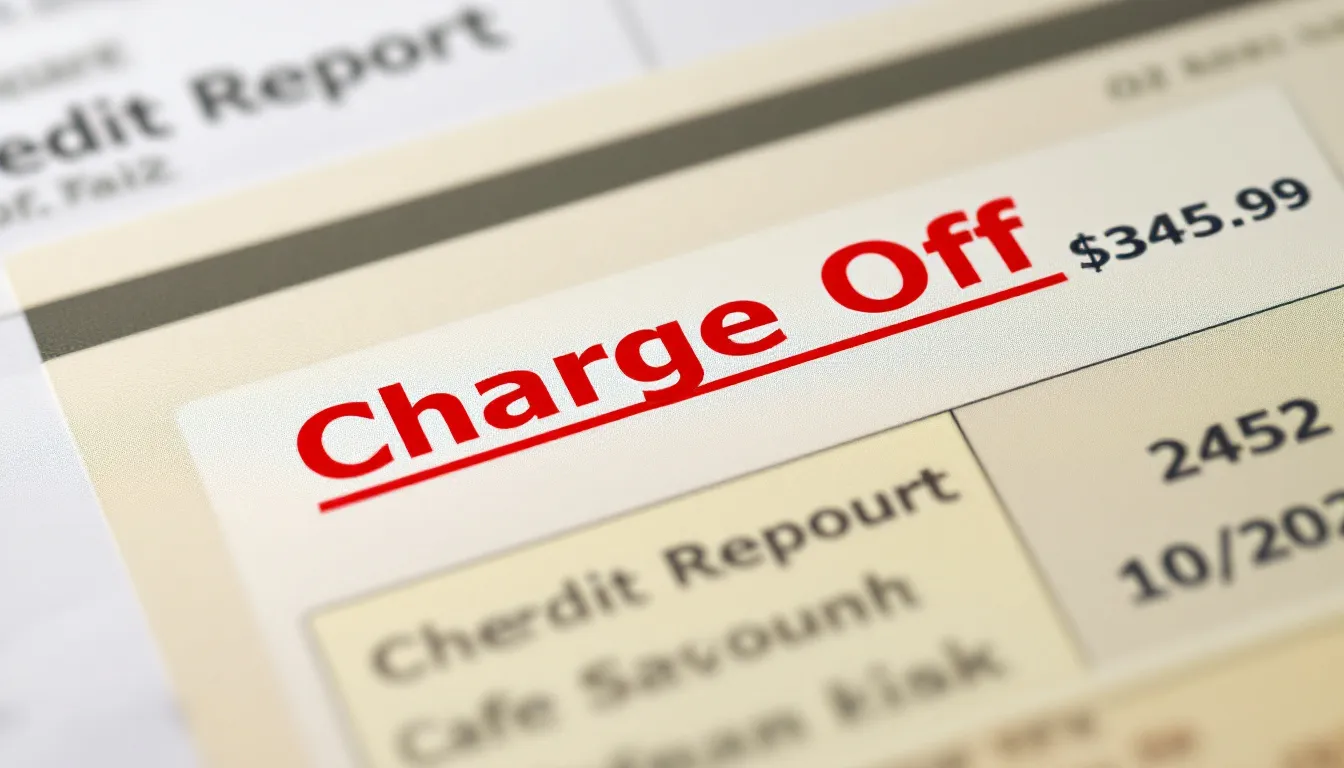What is a Charge Off?
A charge-off means the creditor has written off the account as a loss, but the debt is still legally owed. This occurs when a creditor determines an account is too overdue (delinquent) to continue attempting to collect the debt. It occurs when a creditor marks a debt as uncollectible after a period of delinquency.
Most creditors will only charge off accounts that have been outstanding for between 120 and 180 days. A creditor can be a credit card issuer or lender. If a creditor decides to charge off your account, it will typically report the charge to the national credit bureaus.
Creditors begin the charge-off process once a delinquent account reaches default status. It involves closing the defaulted account and removing the debt from the creditor’s books. At this point, most creditors sell the charged-off account to a debt collection agency or a third-party debt collector, typically for pennies on the dollar.
While the charge-off means the original creditor will no longer attempt to collect the amount owed, you’re still responsible for the debt. Typically, debt collectors continue collection attempts, which include phone calls, emails, and letters. Some debt collection agencies will also sue the debtor for the amount owed and try to get a judgment, which is a court order to pay the debt.
The charged-off account is recorded as part of your credit history in your credit report. The three major credit reporting agencies – Experian, Equifax, and TransUnion– produce credit reports for you. Depending on where the creditor or collection agency reports, it could end up at one, two, or all three credit bureaus.
How do Charge-Offs Affect Credit Scores?
An unpaid charge-off is a significant negative entry on your credit report. Most lenders view charge-offs as a major red flag, leading to loan denials, higher interest rates, or demands for larger down payments on any credit you might qualify for. Payment history makes up 35% of your FICO score, so a charge-off negatively affects this aspect of your credit score.
These events will typically lower your score significantly. As charge-offs are often the culmination of multiple negative reports in a credit file, most charge-offs result in a bad credit score. It’s vital to pay off past-due debt before it becomes a charge-off. You can negotiate a settlement with your creditor if you cannot pay the full amount.
Creditors typically report late or missed payments once it’s 30 days past due. They usually report monthly, so your credit score takes a hit at the first 30-day late report. Then, it takes a more significant drop at 60 days late, another decrease at 90 days delinquent, and so on. When the account is in the 120-180 days past due range, the charge-off lowers an already lowered score.
Once it’s charged off, the account closes, meaning you can’t make catch-up payments to get it back into good standing. It also means the account no longer incurs late fees or accrues interest. However, a new account – the collections account – gets opened, further lowering your score.
Checking Your Credit Report
Regularly checking your credit report is crucial in maintaining your credit health. You can obtain a free credit report from each credit bureau annually—Equifax, Experian, and TransUnion—through AnnualCreditReport.com. Reviewing your credit report lets you identify errors and inaccuracies, including charge-offs, that may affect your credit scores.
Look for outstanding debts, missed payments, and negative entries that could lower your credit score. Staying vigilant about your credit report helps you catch issues early and take corrective action promptly.
How do I Remove Charge Offs from my Credit Report?

Your options for removing a charge-off depend on whether it was legitimate or illegitimate. It is crucial to check the charge-off entry for inaccuracies in detail, such as the amount, date, and creditor information. Verifying the accuracy of this information is essential for disputing potential errors that could lead to the charge-off being removed from a credit report. Keeping records of all communications with creditors and credit bureaus is critical during dispute processes.
Removing an Incorrect Charge Off
Credit report mistakes sometimes happen, and that can include an illegitimate charge-off. An example might be a creditor filing an erroneous report. Or the account of someone with a similar name getting added to your report. In extreme cases, it could also be the result of identity theft.
If you need to remove an illegitimate charge-off or any incorrect information, you must file a dispute with the credit bureau that produced the report with the erroneous item. You can also file a dispute directly with the creditor.
The Fair Credit Reporting Act (FCRA) allows you to dispute any information in your credit reports. It also mandates that the credit bureau investigate disputes and remove inaccurate information.
The websites for all three major credit reporting bureaus have sections for filing a dispute online. You can also file by mail or fax.
Disputing Errors on Your Credit Report
If you find any errors or inaccuracies on your credit report, you have the right to dispute them with the credit bureau. You can dispute errors online, by mail, or by phone. If you dispute a charge-off, you may need to provide supporting documents to prove the information is inaccurate.
When disputing errors, provide clear and concise information about the error, including any supporting documentation. You should include documentation when submitting a dispute to make it easier for the credit bureau to understand your case.
The credit bureau will investigate your dispute and remove the error if it is found to be inaccurate. You can also request a dispute letter from the credit bureau, which can help you track the progress of your dispute. Correcting errors on your credit report can significantly improve your credit scores and overall credit health. If the credit bureau verifies the charge-off but still believes it is inaccurate, you can request a Method of Verification.
Removing a Legitimate Charge Off
Removing a legitimate charge-off is far more difficult, meaning an accurately reported charge-off for a defaulted account. You cannot request the credit bureaus to remove it, as they are legally required to report all true and accurate information creditors provide.
That means you must request that the charge-off be removed from the creditor or debt collector, which can be challenging. There are two primary methods for making this request.
Request Goodwill Adjustment
You can write a goodwill letter to the creditor asking them to remove the charge-off from your credit report. Explain your situation and why they should make an exception for you. You’ll have more luck if you have a longstanding relationship with the original creditor or have other accounts with them.
Negotiate a Pay-for-Delete Agreement
With a pay-for-delete agreement, you agree to pay all or a portion of your outstanding debt in exchange for the creditor removing the charge-off from your account. Not all creditors allow ‘Pay for Delete’ agreements, and attempting to use them can violate creditor agreements with credit bureaus.
Both options are legal and worth trying, but there’s no guarantee that either will work. Creditors and debt collectors have no obligation to remove charge-offs from a credit report. Ensure you get everything in writing if you can work out a pay-for-delete agreement.
Can I Remove a Charge Off without paying?
You can remove incorrect charge-offs from your credit report without paying. If you can prove it’s erroneous, the three credit bureaus legally must remove it from your credit report.
It is unlikely that a legitimate charge-off will be removed before its scheduled deletion date without paying off the debt; however, all charge-offs, whether paid or not, fall off the credit report after seven years. Paid charge-offs are viewed more favorably than unpaid ones by some lenders.
Waiting for the Charge-Off to Expire
A charge-off will remain on your credit report for seven years from the original delinquency date. After seven years, the charge-off will be automatically removed from your credit report. However, waiting for the charge-off to expire may not be the most effective strategy, as it can still limit your access to credit and loans during that time. Instead, consider disputing the charge-off if you believe it is inaccurate or negotiating with the creditor to remove it. Taking proactive steps can help you improve your credit score and regain access to better credit opportunities sooner.
Frequently Asked Questions
Here are the most common questions about removing charge-offs from your credit report.
Do Charge Off Accounts ever go away on their own?

Yes, all negative information eventually disappears from the credit report. Charge-offs stay on the report for up to seven years from the first missed payment.
After that, it’s no longer on your report, but you might still owe the debt. The statute of limitations on debt varies from state to state.
The impact of the charge-off on your credit score begins to lessen before it comes off your report. With good credit activity, your credit score could rebound from the charge-off within six months to a few years. However, lenders might ask about the charge-off even if you have a good credit score.
How much will my Credit Score improve after Removing a Charge Off?
Removing a charged-off account from your credit report is unlikely to have a massive immediate impact. If you pay off the debt, it will be reflected as a “Paid Charge Off.” Even if creditors agree to remove the charge-off early, your score will gradually recover with other positive credit activity.
How do I improve my Credit if I Can’t Remove a Charge Off?
Whether you got the charge-off removed or not, improving your credit score requires developing consistent good credit habits. It can take several months to a few years of good credit activity before your score moves into the higher credit score ranges. However, anyone can raise their credit score by following these steps.
Monitor Your Credit Reports
Keeping track of your credit report won’t raise your score in and of itself, but it will give you the knowledge you need to boost your score. It also lets you check for incorrect information that could lower your credit score.
Under the FCRA, everyone gets one free credit report from the three major credit bureaus each year. You can access your free annual credit report at www.AnnualCreditReport.com.
Hire a Credit Repair Company
Some debtors prefer working with credit repair companies, especially if they have multiple accounts that must be repaired or reconciled. A credit repair company files disputes for incorrect information on your behalf, which could include disputing an illegitimate charge-off.
They can also help you identify other issues affecting your credit and devise a plan to manage your debt. However, be careful, as many scam credit repair companies are looking to take advantage of desperate people. Credit repair agencies that promise to remove legitimate charge-offs are often scams.
Make Timely Payments
Making on-time payments and avoiding missed payments is the most reliable way to raise your credit score. Payment history is 35% of your FICO score and 40% of VantageScores, making it the most significant factor for either credit scoring model. Delinquent payments damage your credit the most, while timely payments help it the most.
If you don’t have many credit accounts to fuel your payment history or need an immediate credit score increase, consider using Experian Boost®. The unique service from the credit reporting agency Experian scans your bank accounts for eligible accounts to add to your payment history. It will try to add rent payments, utility bills, cell phone payments, and even some streaming service subscription payments.
Pay Down Debt
If you currently have high credit utilization, paying down your debt could swiftly and significantly impact your credit score. The three credit bureaus use the credit utilization ratio, which adds up your total credit balances over your total available credit limits. For example, if you carry a $1,000 balance on a $10,000 credit limit, your utilization is 10%.
Credit utilization below 30% will help increase your score quickly. It should be under 10%, which is ideal and could increase your score by double digits.
Don’t Close Old Accounts
Closing an old credit account could negatively impact your credit score for two reasons. Removing the account could lower the average age of all your accounts. Length of credit history makes up 15% of your score, and older accounts make you seem more creditworthy. It could also increase your credit utilization ratio, as that credit limit is no longer factored into your total available credit.
Only Use New Credit When Necessary
Applying for new credit results in a hard credit inquiry, also called a hard credit pull. Each new hard credit inquiry can lower your FICO score by five points. So, avoid opening new accounts unless it’s necessary. For example, taking out a debt consolidation loan or opening a balance transfer card could help reduce your credit utilization ratio. The positive effects of lowering your credit utilization ratio would outweigh the negative impact of the hard credit pull.
Open a Secured Credit Card
Secured credit cards are more accessible for bad credit borrowers. They’re called “secured” because you must provide a cash security deposit as collateral to open the card. Once it’s opened, you can use it and pay it off to build a positive payment history.
Consider a Credit-Builder Loan
Credit-builder loans operate differently from traditional loans. They’re usually for small amounts, and instead of disbursing the funds at the beginning of the loan, the lender sets them aside in a savings account or certificate of deposit (CD). You make regular payments plus interest, like a standard loan, to build a positive credit history. Once you pay off the loan, the lender releases the loan proceeds.
How do I Manage Debt to Avoid Charge-Offs?
Effective debt management is key to avoiding charge-offs and maintaining good credit health. Credit counseling agencies can assist with managing debts and improving credit profiles.
Here are some tips for managing debt:
- Make on-time payments: Late payments can lead to charge-offs, so pay your bills on time.
- Keep credit utilization low: High credit utilization can negatively affect your credit scores, so keep your credit utilization ratio below 30%.
- Monitor your credit report: Regularly review your credit report to identify any errors or inaccuracies.
- Avoid new credit inquiries: Applying for too much credit can negatively affect your credit scores, so limit your credit inquiries.
By following these tips, you can maintain a healthy credit profile and avoid the negative impact of charge-offs.
Working with Credit Bureaus
If you have a charge-off on your credit report, you may need to work with the credit bureau to have it removed. Here are some tips for working with credit bureaus:
- Contact the credit bureau directly: If you have a dispute or question about your credit report, contact the credit bureau directly.
- Provide clear and concise information: When disputing errors or requesting changes to your credit report, provide clear and concise information.
- Follow up: If you don’t hear back from the credit bureau, follow up to ensure your dispute or request is being processed.
Working effectively with credit bureaus can help you address charge-offs and improve your credit report, ultimately leading to better credit scores and financial opportunities.
Do Charge Offs impact my Small Business Loan options?
A charge-off on your credit history could potentially limit your small business loan options. Commercial lenders consider your personal and business credit when underwriting business loan requests. If you don’t have business credit yet, then your personal credit score is weighed more heavily.
Even if you meet the minimum credit score requirement, a charge-off could give some lenders pause. They will review your full credit report, and you may have to explain the reason for the charge-off and your actions to correct it.
You might want to take some time to improve your personal credit score before applying for a business loan. However, bad credit business loans are available if you have a low score but need urgent funding.
Getting a business loan with bad credit can be challenging. You’ll likely have to apply to an alternative online lender or marketplace, like UCS. Traditional lenders like banks and credit unions usually won’t issue a bad credit business loan.
In addition to having fewer loan options, small business loans for bad credit usually have lower credit limits, higher interest rates, additional fees, shorter terms, and frequent payments. One way to think of a business loan for bad credit is as a form of bridge financing.
Bad credit business loans can provide short-term financing to help support operations. Your credit could improve as you repay the loan and grow the business. Once you have a better credit score, a longer time in business, and higher revenue, you can qualify for a longer-term, lower-cost loan. Sometimes, you can use the long-term loan funds to pay off the bad credit business loan.
Bad Credit Business Loan Pros & Cons
Pros:
- Accessible financing for borrowers with a low credit score.
- Could potentially help build or repair credit with timely payments.
- Might be able to use the funds to pay off existing debt.
- Quick and easy online applications.
- Usually fast approval and funding times.
Cons:
- Higher interest rates & fees than conventional loans.
- Lower borrowing amounts than traditional business loans.
- Typically short-term financing with frequent repayments.
- Might require collateral or a personal guarantee.
- Could require automatic payment withdrawals.
- Fewer options for lenders and loan types.
How to Get a Charge Off Removed – Final Thoughts
A charge-off in your credit report can significantly lower your credit score and cause issues getting approved for a loan or credit card. If the charge-off was erroneous, you should file a dispute with the credit reporting agencies or the creditor that reported it.
Removing a genuine charge-off is more challenging. All charge-offs fall off the credit report after seven years. If you want it removed before that, you can request a goodwill adjustment or negotiate a pay-for-deletion agreement. While neither option is guaranteed, it doesn’t hurt to try.
Fortunately, your credit score can rebound from a charge-off, whether you can get it removed or not. It takes months or years of good credit habits, such as never missing a payment and keeping credit utilization low, but anyone can raise a bad credit score.
Contact us with more questions about removing charge-offs or applying for a small business loan. Our loan experts can help you find the most advantageous business loans for your credit score.














